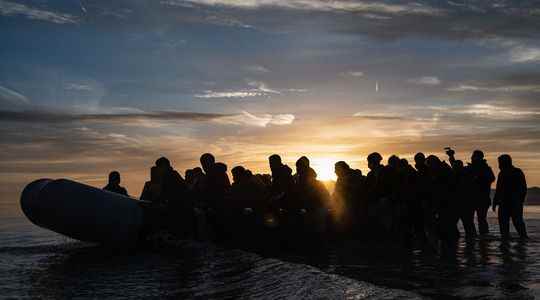Poison of the relationship between France and the United Kingdom, the fight against illegal immigration is the subject of a new cooperation agreement signed Monday between the two countries to stop the crossings of the Channel by migrants, always more many attempt this dangerous journey. His signature comes a year after the death of 27 migrants on November 24, 2021, when their boat sank off Calais, the worst tragedy to date recorded in the Channel.
After years of sometimes virulent disputes over the migration issue, notably when Boris Johnson and Liz Truss were prime ministers, the new British executive has adopted a more conciliatory tone with the French government, calling for a more “constructive” relationship. Prime Minister Rishi Sunak, himself the grandson of Indian immigrants, has however taken a tough stance on immigration and backs previous Conservative governments’ controversial plan to send asylum seekers to Rwanda, which is still on hold. to judicial review.
- What efforts are being made in each camp?
Main point of this agreement: the British will have to pay 72.2 million euros in 2022-2023 to France. In return, the latter undertakes to increase its security forces by 40% (350 additional police and gendarmes) on the beaches from which migrants leave for the British coast. However, contrary to what the United Kingdom wanted according to the press across the Channel, no quantified target for the interception of boats appears in the joint declaration signed in Paris by the French Minister of the Interior Gérald Darmanin and his counterpart Suella Braverman.
“There is no silver bullet, but this new agreement will allow us to significantly increase the number of French gendarmes patrolling the beaches of northern France and ensure that British and French officers work hand in hand. to stop migrant smugglers,” said Suella Braverman. In this text, London and Paris first set themselves the objective of deploying “technological and human resources”, including drones, on the French coast to better detect, monitor and intercept boats.
- Concretely, what will change?
For the first time, teams of observers will be deployed on both sides of the Channel to “improve the conduct of debriefings of migrants” and “increase the exchange of information” between the two countries. The agreement also provides for the financing of “detection dogs” in the ports and the installation of surveillance cameras at the main border crossing points along the coast.
Reception centers for migrants must also be created in the south of France to dissuade exiles who take the Mediterranean from going back to Calais and “offer them safe alternatives”. The two countries also want to collect and use information, in particular “from intercepted migrants”, to better dismantle smuggling networks and deter crossings through joint work “as early as possible”, in conjunction with the countries of origin. and transit of exiles.
- Why the signing of an agreement became urgent for the two countries?
This agreement comes as the two governments are under pressure on the migration issue. In France, Gérald Darmanin, accused by the right and the far right of not deporting foreigners banned from the territory enough, will present a bill in early 2023 aimed at toughening asylum procedures.
In the UK, the ruling Conservative Party has made immigration control a priority since Brexit, but is coming up against the exponential curve of illegal crossings. “We intercept much more than before (more than 30,000 migrants to date in 2022 against 22,600 in 2021)” and “we devote 255 million euros” to securing the coast, we argue on the French side.
But these efforts remain insufficient to curb the phenomenon. On Sunday, the British Ministry of Defense said that more than 40,000 migrants had crossed the Channel since the start of the year, a record. More than 200 people have died or gone missing, at sea or on land, trying to reach England from the northern coast of France since 2014, according to the International Organization for Migration (IOM).
